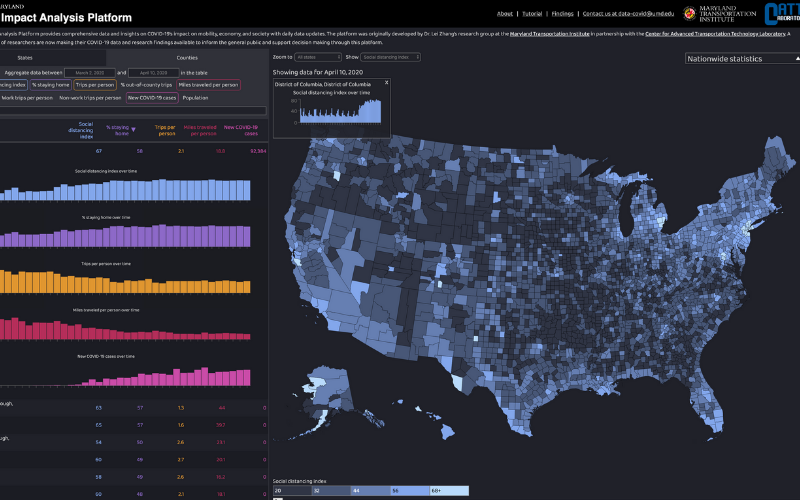Big Data Analysis of Human Mobility Behavior

Project Leads: Lei Zhang, Michael Pack
Maryland Transportation Institute, CATT Lab
|
On April 13, 2020, the Maryland Transportation Institute unveiled a new interactive analytics platform that measures the impact of COVID-19 on mobility, health, the economy, and society. The UMD researchers are making their data and findings, which are updated daily, available to the public in order to help officials make informed decisions. Access the COVID-19 Analytics Platform |
Researchers at the University of Maryland’s (UMD) Maryland Transportation Institute (MTI) and its affiliated Center for Advanced Transportation Technology Lab (CATT Lab) – both part of UMD’s A. James Clark School of Engineering – have been pulling in information from mobile devices such as smartphones, GPS devices, sensors located along highways and roads, and other sources. CATT Lab operates the largest transportation and mobility data archive in the nation.
The result of their work is a real-time picture of where people are traveling, how their behaviors – including social distancing – can affect spread of the virus, and how this pandemic is impacting the economy.
Big data can convey the movement of people, cars, and trucks across the nation and in each community, help in making tough decisions on social distancing measures, and optimize economic stimulus in order to both protect life and save the economy, according to MTI’s director, Herbert Rabin Distinguished Professor Lei Zhang.
Analyzing these patterns can help pinpoint vectors for the spread of the virus and can help policymakers understand which social distancing measures need to be put in place. Zhang, along with CATT Lab Director Michael Pack, and their teams of researchers hope their work can help decision-makers use scientific evidence to decide when and how to remove social distancing mandates so that the economy can recover as soon as possible.
MTI is part of an International Data Collaborative, comprising more than a dozen universities, non-profits, and data providers, that has formed with the goal of studying the effects of COVID-19 and the effectiveness of public response efforts using big data. Researchers involved in the initiative include experts in transportation and travel behavior, epidemiology, applied mathematics, and big data analytics and visualization.
In addition to tracking travel behavior, MTI is also working on using data to monitor how communities and businesses are negatively impacted by COVID-19 based on changing visits to points of interest (POI) such as restaurants, shopping malls, gyms, and other small businesses across the country. Governments at all levels may use the results to target stimulus funds and loans to areas that are hit the worst by the pandemic, according to Zhang. As such, MTI researchers are working with several top economists and data scientists at UMD on this important topic.
Travel down—except for tractor trailers
Early numbers gathered by the CATT Lab, using its Regional Integrated Transportation Information System (RITIS), confirm that most travel has decreased sharply since the state of Maryland implemented restrictions due to COVID-19.
During a two-day period after COVID-19 travel restrictions were imposed, traffic volumes showed a 19% decrease compared to a similar time window prior to the restrictions. However, tractor trailer volumes increased by 14%, most likely due to increasing demand as businesses and families stock up essential goods and supplies as they prepare for social distancing, Pack said.
Top